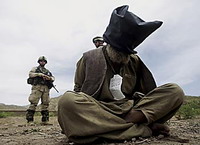America asks for improvements in Geneva Conventions
The United States wants the Geneva Conventions to answer questions arising from the fight against terrorism.

John Bellinger III, the State Department's legal adviser, said the laws of war only apply to conflicts between nations - not to insurgents or international terrorist groups.
"The United States remains absolutely committed to the Geneva Conventions," he told reporters on the sidelines of a conference hosted by the International Committee of the Red Cross, the guardian of the rules drawn up after World War II.
But, he added, "one does have to read what they say, and they do not apply to every situation."
"The Geneva Conventions do not give you answers about who can be held in a conflict with a non-state actor," such as insurgent groups, Bellinger said. "They do not tell you how long you can hold someone in a conflict with a non-state actor."
He said the conventions "were designed in 1949 for different sorts of circumstances, and they don't provide easy answers in all cases to how to deal with international terrorists."
Greater clarity is needed about which practices are permitted and which are prohibited, he said.
Asked about the case of an Associated Press photographer held by the U.S. military in Iraq for 19 months, Bellinger said his understanding was that American forces were operating under an international mandate that allows for the detention of people who might pose a security threat.
The Geneva Conventions contain specific references to the protection of journalists operating in war zones, including that they be treated as civilians unless they take part in hostilities.
U.S. military officials have alleged that Bilal Hussein, detained in Ramadi on April 12, 2006, had links to terrorist groups. The officials have refused to disclose the evidence against him.
An AP investigation of the case shows no support for allegations that Hussein, 36, took part in insurgent activities or bomb-making as alleged.
Bellinger said he understood the U.S.-led multinational force in Iraq had conducted multiple reviews of Hussein's case and decided to refer it to an Iraqi tribunal.
"If we picked up a photographer in the United States, then he could be held only for a limited time unless he were tried," Bellinger said, adding that international law does not stipulate how long a detainee can be held and whether the person needs to be charged.
"That's the difference in international law," he said.
Dorothea Krimitsas, a Red Cross spokeswoman, said the neutral agency has visited Hussein and other U.S. detainees in Iraq, the last time over the summer, to check on his detention conditions and speak privately with him.
But she said the Red Cross never makes its observations public, and she couldn't say whether the group will have access to Hussein when he is in Iraqi custody.
Bellinger said the lack of legal clarity when it comes to dealing with non-state actors has posed a challenge to the United States, which has always regarded itself as a leader in the field of international law.
"What we need to do is work with other governments to first identify where there are gaps or lack of answers, and then to start developing some principles about how one would respond, at least as a matter of policy," Bellinger said.
Once a framework has been developed to address outstanding questions about the treatment of non-state actors, "one can begin to think later on whether one would try to turn it into something that might be binding," he said.
New U.S. legislation to prohibit intelligence-gathering techniques that could amount to torture - banned under international law - showed that the U.S. approach to dealing with the threat of terrorism was evolving, he said.
Bellinger also noted that the U.S. Army's new field manual forbids waterboarding, an interrogation technique that simulates drowning.
He also welcomed a bill being examined by U.S. lawmakers that would allow for prosecution of private contractors if they commit crimes in war zones.
Subscribe to Pravda.Ru Telegram channel, Facebook, RSS!




